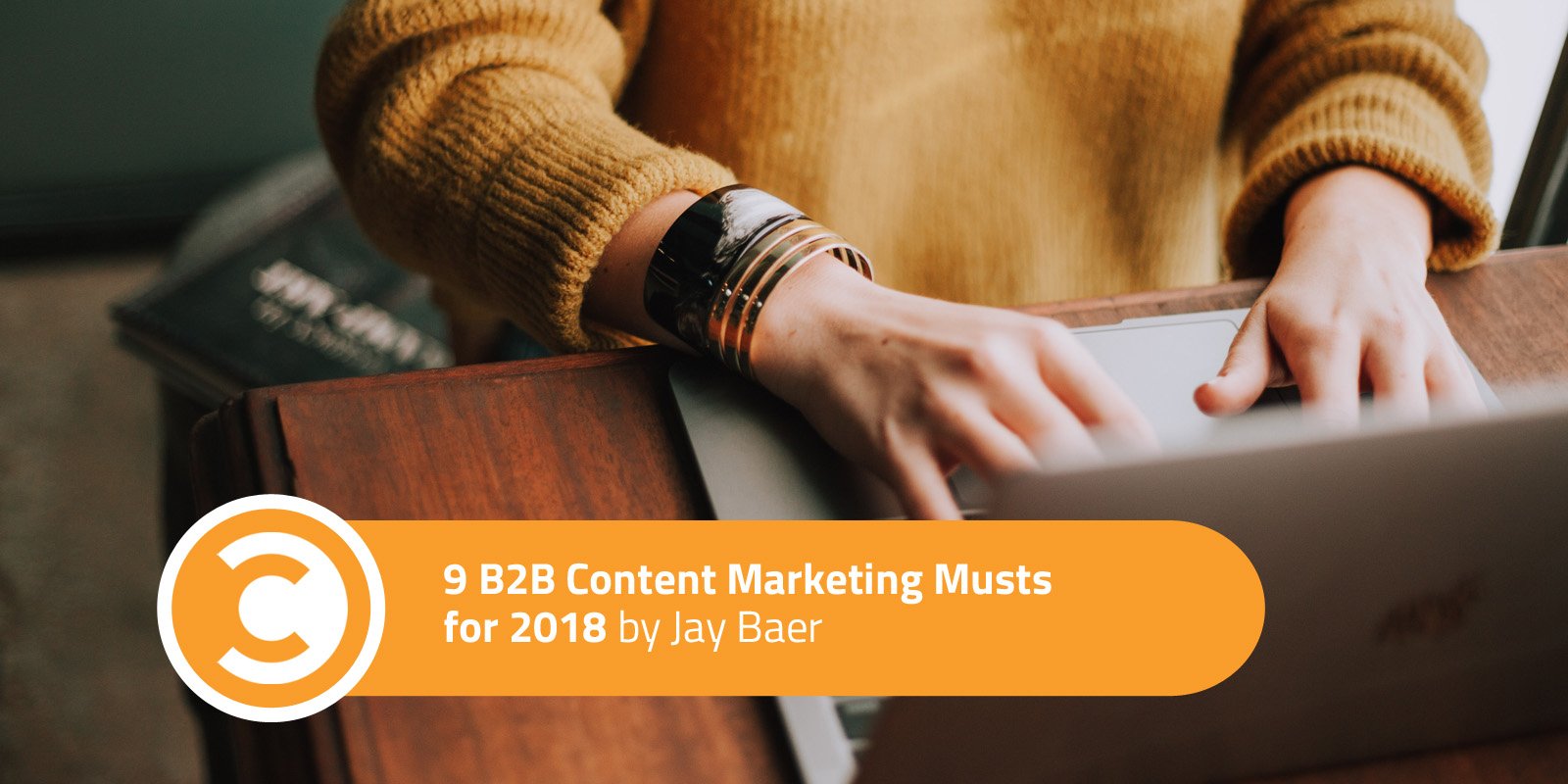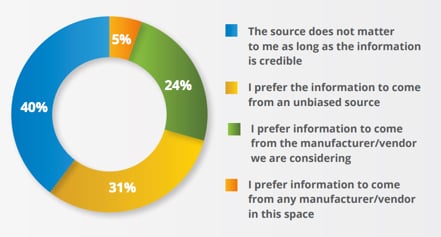
B2B content marketing is almost universally embraced. 87 percent of all business-to-business organizations are using content, according to an eMarketer survey of firms with 100 employees or more.
So the question about B2B content marketing isn’t WHETHER it’s a viable marketing approach. Rather, it’s WHAT must be done in 2018 to make it more viable, and HOW content marketing for B2B must change in the face of altered customer expectations and heightened competition.
eMarketer recently released a new report on this topic called B2B Content Marketing 2018. I was one of the content marketers interviewed for this study. It’s a sound and thorough report, and I encourage you to review the summary, listen to the podcast overview, and consider becoming an eMarketer PRO subscriber to get access to the entire piece.
Good news: I’ve reviewed and analyzed the complete report. Here are my favorite findings, plus commentary on what I think they mean for the future of B2B content marketing.
Publish Your Own Research
According to a survey from Ascend2, 50 percent of B2B marketers say that research reports generate leads with the highest customer conversion rates, compared to other forms of content marketing.
(Note: Convince & Convert will be kicking off a research series soon.)
50% of B2B marketers say research reports generate leads with the highest customer conversion rates. #contentmarketing Click To Tweet
Seek Content Downloads
The same survey from Ascend2 finds that leads with high conversion rates begin with a content download. Two-thirds of B2B content marketers believe this to be the case. Compare this to webinar registration (45 percent) and demo request (37 percent).
This surprises me. I would assume (wrongly, it appears) that a webinar registration indicates more specific and meaningful interest than a content download.
Taken in tandem with the point above about research (which is typically distributed via download, like the eMarketer report) the “make research, and allow people to download it if they provide their information” is an even more sound approach.
Know That Credibility Is Only Somewhat Important
This one is disheartening to me. Research from our friends at the Content Marketing Institute and SmartBrief found that when seeking information about potential products and services in a B2B environment, prospective buyers aren’t all that concerned about where that information comes from.

40 percent of respondents say the source of the information doesn’t matter, as long as it is credible. (To which I say, “Well, then how do you know it’s credible?”)
31 percent say they prefer the information to be unbiased.
Interestingly, 24 percent prefer the information to come from the company or manufacturer that they are considering. (I call this the “fox watching the henhouse” approach to content marketing.)
Taken together, I interpret this to mean that while it is, of course, optimal to have strong third-party endorsements, creating content marketing that extolls your own virtues is more than just possible. It’s actually acceptable and desirable in many B2B consideration funnels. Fascinating!
40% of B2B buyers say when researching, the source of info doesn’t matter, as long as it’s credible. Click To Tweet
Consider Increasing Your Content Marketing Budget
Competition gets tougher, and audiences get more jaded. That’s the current cycle in B2B content marketing. To continue to succeed, many firms are increasing investment.
38 percent of companies in B2B anticipate boosting their content marketing budgets in 2018, according to an Informa survey.
And content is also becoming a larger and larger share of total marketing spend. Based on their research, Content Marketing Institute finds that the most successful companies in B2B are spending approximately 40 percent of all marketing dollars on content marketing.
So what do we cut in that scenario, as content vacuums up more and more budget dollars? Collateral material? Events and exhibits? Sponsorships? Print ads? Logo golf balls?
Part of this budget increase is for content marketing software, including robust editorial calendars and productivity tools.
38% of B2B companies anticipate boosting their #contentmarketing budgets in 2018 Click To Tweet
Don’t Stop Content Marketing at the Purchase
You’ll find excellent commentary in the eMarketer report about the need for content to be created and targeted explicitly at all stages of the funnel, including post-purchase. I couldn’t agree more. In fact, I wrote a whole piece about why B2B content marketers are spending their resources incorrectly and mostly ignoring content for retention:
B2B Marketers Are Working Harder Than Necessary
Think Quality, Not Quantity
The script has flipped on this equation. Back when there were still green field topics and authority to be seized, a quantity-driven strategy made sense. Now, there are very few—if any—stones unturned.
Changes to customer expectations, massively increased competition, and social media and search engine algorithm shifts have, in combination, resulted in a new content marketing world. Now, crafting the definitive piece on a particular topic is a far better idea than crafting a bunch of okay content executions across a broader topical spread.
I loved this quote from the eMarketer report:
“There’s this push for quality content over quantity,” said Timothy Morral, director of editorial content at Walker Sands Communications. “Part of it is driven, because B2B brands recognize that they need quality leads. Quality content and quality leads work in parallel.”
Exactly! Not only does quality content break through, but quality content creates quality leads, and mediocre content creates mediocre leads.
Get Good at Multi-Sensory Content Marketing
Most B2B content marketers come from a writing or publishing background, either via education or experience. This is because, for a long time, B2B marketers deployed the overwhelming majority of their content marketing in writing. B2B content marketing meant white papers, ebooks, data sheets, FAQs, and so forth.
Now, however, changing consumer content consumption patterns (powered partially by the shift to mobile and the ability to stream video just about everywhere) have made written content (like this content, ironically) less popular, in favor of multi-sensory executions like videos and interactive white papers and the like.
Companies (and Convince & Convert partners) like Vidyard and SnapApp are powering B2B video and interactive content to increase reach and conversions. Here’s an article Anthony Helmstetter, one of our Analysts, wrote on video marketing:
The 3-Part Secret to Video Marketing in 2018
Don’t Sleep on Search
Despite the shift to multi-sensory content executions to break through the clutter, a Digital Donut survey found that organic search is still the top-performing method for driving traffic to content, with 44 percent of respondents listing it as one of their top three choices.
39 percent cited email to your own list. (Although if those prospects are already on your list, it’s not really a new audience or source of traffic.) Paid search ranked third with 33 percent of respondents ranking it in the top three. Linkedin and Facebook were next, and the remaining options lagged far behind.
Organic search is still the number one tactic for driving traffic to B2B #contentmarketing Click To Tweet
Find Ways to Boost Relevancy
Your prospective customers, even when in active shopping mode, have no shortage of content consumption options. Content is EVERYWHERE. From you, from your competitors, and from third parties.
Content becomes disproportionately successful when it’s more interesting at the format level (video, interactivity), or more specific and relevant to the potential customer. This is what is powering the move toward account-based marketing (ABM) in B2B. In an ABM scenario, the content is by definition customized and tailored to a specific industry or company. Why? RELEVANCY is the killer app.
One of the easiest ways to boost content marketing relevancy is through personalization. If you’re not already personalizing, you’re probably behind. 68 percent of B2B marketers said they are testing personalization of content and offers, according to a Chief Marketer study.
As I acknowledged in the eMarketer study, however, while personalization is effective—and clearly is the future of content—it requires effort. This approach can be a strain on your resources and team. This is especially true if you are already having trouble getting buy-in from leadership that the existing content program is worthwhile. Asking to allocate additional funds to create highly bespoke content can be an obstacle.
There you have it. The 9 B2B Content Marketing Musts for 2018. Thanks to eMarketer and all the other organizations that are putting out such great research and reports on this topic.
If my team and I here at Convince & Convert can help you stay ahead of customer expectations in the area of content marketing, please get in touch about a free analysis. We create Digital Marketing Maturity Maps for some of the world’s most interesting brands, and guide them as they accelerate, measure, and propel their digital.